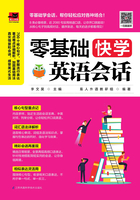
101. I have no time to have breakfast now.
我现在没时间吃早餐了。
重点解析
time作不可数名词时意为“时间”,通常have (enough/no/some/little) time to do表示“有(足够的/没有/一些/很少)时间做某事”;作可数名词时,则表示“次数,回;时代,时期”。
情景对话
Steven: Oh, my God. It's almost eight. I have no time to have breakfast now. Julia: Don't worry. It's only ten to seven. You still have enough time for your breakfast.
史蒂文:哦,天啊。都快8点了。我现在没时间吃早餐了。
茱莉娅:不要担心,现在刚6点50分,你还有足够的时间吃早餐。
相似表达
The clock on the wall says eight to seven.
墙上的钟表是6点52分。
I'm afraid you will not have enough time for lunch.
恐怕,你没有足够的时间吃午饭了。
I am ready for breakfast.
我准备好吃早餐了。
11. You must have forgotten to set your watch back.
你一定忘了把表拨回去。
重点解析
must作情态动词,意为“必须,一定”,后接动词原形;也可以用于表示对逻辑事实的肯定推测,must be/do表示对现在事实的推测,而must have been/done表示对过去事实的推测。
情景对话
Steven: Oh, it's almost eight. I must leave for work now.
Julia: You must have forgotten to set your watch back. My watch says six fifty.
史蒂文:哦,将近8点了。我现在必须出发去上班了。
茱莉娅:你一定忘了把表拨回去。我的表才6点50。
相似表达
She must be hungry now.
她现在一定饿了。
He must be having breakfast now.
他现在一定在吃早餐。
You must have had a heavy lunch.
午饭你一定吃得很多。
12. How about one more piece of pie?
再吃一块馅饼吧?
重点解析
形容词more意为“更多的,更大的”,除用于构成多音节形容词的比较级形式外,也可以与不定代词或是数词连用,如a few/some/any more (...)表示“另外一些”, one/two/three more...表示“另一个/两个/三个……”。
情景对话
Julia: How about one more piece of pie?
Steven: Thanks. I'm full.
茱莉娅:再吃一块馅饼吧?
史蒂文:谢谢。我吃饱了。
相似表达
Would you like another piece of pie?
你想再吃一块馅饼吗?
What about one more piece of bread?
再吃一块面包吧?
I'll have a little bit.
我再吃一点。
13. Eat up your vegetables.
把蔬菜吃光。
重点解析
动词词组eat up意为“吃完,喝完(汤)”,可以用作eat...up或是eat up...;动词eat可以用作及物动词,也可以作不及物动词,其过去式和过去分词形式分别为ate, eaten。
情景对话
Julia: Eat up your vegetables.
Steven: But I have had enough.
茱莉娅:把蔬菜吃光。
史蒂文:但是,我已经吃饱了。
相似表达
Eat up your fish and don't be so finicky.
把鱼吃光,别太挑剔了。
Eat to leftovers.
吃掉剩菜!
He has eaten up his dinner.
他把饭吃完了。
14. We breakfasted on toast and milk.
我们早餐吃的是烤面包片和牛奶。
重点解析
breakfast通常作不可数名词,意为“早餐”,常与动词eat, have连用;在此句中用作不及物动词,其过去式形式为breakfasted, breakfast on...表示“用……早餐,吃……早饭”。
情景对话
Julia: What did you have for breakfast?
Steven: We breakfasted on toast and milk.
茱莉娅:你们早餐吃的是什么?
史蒂文:我们早餐吃的是烤面包片和牛奶。
相似表达
We're having bread for breakfast.
早餐我们正在吃面包。
Our supper is roast duck.
我们晚饭吃的是烤鸭。
We could have steak for supper.
我们晚饭可以吃牛排。
15. You eat like a horse.
你饭量真大。
重点解析
eat like a horse用于口语中,意为“吃得很多”;而eat sb out of house and home在口语中通常用作戏谑语,表示“把某人吃穷”。
情景对话
Steven: I had three hamburgers, two eggs, some beef, a bowl of rice and an apple for lunch.
Julia: You eat like a horse.
史蒂文:午饭我吃了三个汉堡、两个鸡蛋、一些牛肉、一碗米饭,还有一个苹果。
茱莉娅:你饭量真大。
相似表达
She is a devil to eat.
她很能吃。
You've not eaten much supper.
你晚饭吃得不多。
I never eat a big dinner.
我向来饭量不大。
You eat like a bird.
你饭量真小。
16. I'm picky about food because I am on a diet.
我正在节食,对饮食很挑剔。
重点解析
形容词picky意为“挑剔的,难以取悦的”,通常用于口语中,作表语或是定语。在美式英语中,其比较级和最高级形式分别为pickier, pickiest; be picky about...表示“对……挑剔”。
情景对话
Steven: You seem to have a light lunch.
Julia: I'm picky about food because I am on a diet.
史蒂文:你午饭似乎吃得很少。
茱莉娅:我正在节食,所以对食物很挑剔。
相似表达
Eat more and you will put on some weight.
多吃点,你才会长胖。
I can't eat any more.
我吃不下了。
Don't be picky.
不许挑食。
17. Tidy up your room.
把你的房间收拾收拾。
重点解析
动词词组tidy up意为“使整齐,整理”,还可以用作tidy (sb/sth/oneself) (up); tidy sth away表示“将某物收起,使房间等变得整齐”; tidy sth out则表示“移去不要之物而将余下物品整理好;清理”。
情景对话
Julia: Tidy up your room.
Steven: OK. I will do it right now.
茱莉娅:把你的房间收拾收拾。
史蒂文:好的。我这就去收拾。
相似表达
Clean up your room.
把你的房间收拾收拾。
Please sweep the floor.
请把地扫扫。
Please mop the floor.
请拖拖地。
I kept cleaning the apartment this morning.
今天早上我一直在打扫公寓。
18. It's your turn to take out the garbage.
今天该你扔垃圾了。
重点解析
可数名词turn意为“次序,顺序;轮到的机会”,通常用作单数形式;it's one's turn to do表示“轮到某人做某事”,而wait (for) one's turn (to do)表示“等候(轮到某人做某事的)机会”。
情景对话
Julia: It's your turn to take out the garbage.
Steven: I see.
茱莉娅:今天该你扔垃圾了。
史蒂文:我知道了。
相似表达
We take turns to take out the garbage.
我们轮流扔垃圾。
They take out the garbage by turns.
他们轮流扔垃圾。
I'll take a turn to take out the garbage.
该我扔垃圾了。
19. The first thing I do after getting up is to make the bed.
我起床后的第一件事就是整理床铺。
重点解析
动词词组make the bed意为“整理床铺,铺床”,而as one makes one's bed, so one must lie on it是一则谚语,表示“自作自受,自食其果”。bed也可以作及物动词,表示“提供住宿,供给床位”,其过去式和过去分词形式分别为bedded, bedded。
情景对话
Steven: The first thing I do after getting up is to make the bed.
Julia: That is a good habit.
史蒂文:我起床后的第一件事就是整理床铺。
茱莉娅:那是个好习惯。
相似表达
Draw the curtain before going to bed.
睡觉前把窗帘拉上。
He got up and made his bed.
他起床后就叠好被子。
She forgot to make the bed again.
她又忘记整理床铺了。